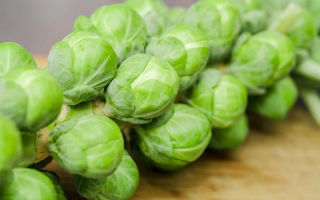Content
The benefits and harms of Brussels sprouts are known to all connoisseurs of this product. The vegetable is rich in beneficial vitamins and minerals, even used for diabetes. This is a type of cabbage that does not occur in the wild. It was bred in Belgium, after which it spread to nearby countries such as Germany, France and Holland.
Composition and calorie content
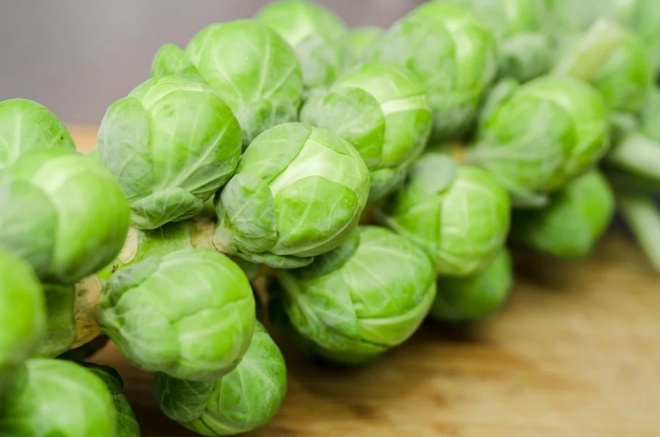
Brussels sprouts are a dietary product. 100 g of a vegetable contains from 35 to 40 kcal. And the protein content reaches 5 g. It is protein that is so necessary for losing weight and gaining muscle mass. For comparison, approximately the same ratio of protein in the product is observed in industrially produced curd and dairy desserts. The fat content is low, only 1%, sugar - 3%.
In addition, Brussels sprouts are rich in vitamins. A detailed description and amount of vitamin in the table below:


The vegetable is also rich in minerals. Their list and number are in the second table. As you can see, Brussels sprouts are high in vitamin C, which is responsible for the immune system and is so beneficial for the body. The same goes for other vitamins and minerals.
The benefits of Brussels sprouts for the human body
To experience the benefits of Brussels sprouts, it's important to include them in your diet. A one-time dose will not help improve the condition. And if you take it from time to time, then it strengthens the human body and saturates it with a vitamin complex.
For example, it is able to lower cholesterol levels by normalizing the functioning of the cardiovascular system. This becomes possible due to the presence of amino acids and glucose in the composition. They help protect the walls of blood vessels from damage by strengthening them. To enhance the effect, it is recommended to take Brussels sprouts with olive oil. You shouldn't combine it with mayonnaise, butter, ketchup and fatty cheeses.

Since the composition contains lutein and zeaxanthin, the vegetable improves vision. Daily use inhibits retinal degeneration processes. Vitamin A is known to have a positive effect on vision. As experts noted, when taking Brussels sprouts, brain activity increases, neurons are protected from damage due to vitamin K in the composition. And the presence of a large amount of vitamin C provides strong immunity.
For women
Size is not the only difference between Brussels sprouts and related varieties. The vegetable is good for a woman's health. The protein content in it reaches 5%. Just 100 g of the product provides more than 90% of the daily value of vitamin C.

The complex of vitamins in the vegetable helps the woman's body regulate reproductive function, hormonal levels, and metabolic processes. It is rich in a substance called Diindolylmethane (DIM).The element is able to neutralize excess estrogen. Doctors know that excess of it leads to:
- violation of bone formation;
- the appearance of cysts and the expansion of the endometrium;
- decreased production of breast milk.
Brussels sprouts help prevent and fight breast cancer. A study was conducted in which it was proved that the risk of developing breast cancer is reduced by 30% if you regularly eat the vegetable.

For men
Despite the fact that Brussels sprouts are a dietary product, unlike other vegetables, they are high in calories and protein. It is the nutritional value that is necessary for a man who needs to replenish his expended energy. Fiber and amino acids have made the vegetable beneficial for athletes. It is included in sports nutrition and is consumed after exercise. Brussels sprouts are especially indicated for bodybuilders. The composition of the vegetable allows you to regulate the exchange of fat, breaks down and removes toxins from the body.

Vitamins and minerals have a positive effect on the regulation of hormonal levels, improving the function of the brain and central nervous system. If a man consumes a vegetable once a week or more, then he will help prevent the formation of the following diseases:
- crayfish;
- stroke;
- heart attack.
A man needs to give up Brussels sprouts if his iodine metabolism is disturbed. The vegetable contains indole, which prevents the thyroid gland from absorbing iodine normally. As a result: a deterioration in well-being, a negative effect on the immune system and brain processes. It is forbidden to use the product in case of exacerbation of the disease of the gastrointestinal tract and urinary organs.
For children and the elderly
Brussels sprouts are visually interesting for children, as they are small in size and attractive in shape, thanks to which they eat it with pleasure.

Parents need to add several heads of cabbage to any dish. Then the child will receive a daily intake of useful vitamins, minerals and substances. Vitamin K is especially useful for children. With it, the blood coagulates better, bone weave forms faster, and bones grow stronger and grow faster.
This vegetable is a source of vitamin C, which strengthens the immune system of children and protects the young body from viruses and colds. If the child is sick with diabetes, then the product reduces the need for insulin.
It is enough to include it in the student's diet to improve:
- vision;
- memory;
- metabolism;
- Attention;
- physical endurance;
- circulation.
The vegetable is harmful for diarrhea, individual intolerance, for problems with impaired iodine absorption, and for acute colitis.
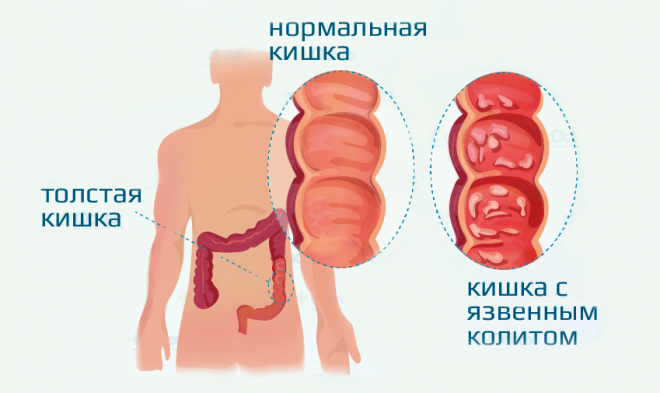
The task of older people is to monitor their health and diet, since the risk of cardiovascular disorders is high. The benefits of Brussels sprouts are obvious as they protect and strengthen the cardiovascular system. The vegetable helps the digestive tract and nourishes the bones.
During pregnancy and breastfeeding
Cabbage is irreplaceable during conception and pregnancy. Folic acid and B vitamins, which are in the composition, help the formation of the fetus and prevent the formation of birth defects. Only 100 g of Brussels sprouts meets the daily need for vitamin K, which is responsible for blood clotting. This reduces the risk of bleeding during childbirth.
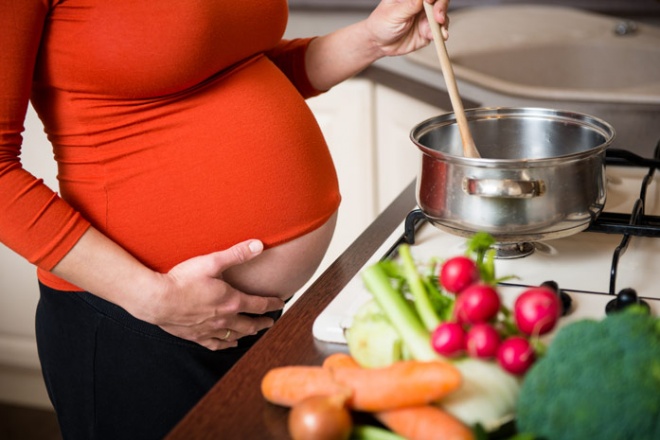
Do not stop using the product after childbirth. It promotes breast milk production and is also good for babies. The vegetable is rich in nutrients and nutrients, has no allergens, and also contains dietary fiber.If the baby suffers from constipation, then Brussels sprouts will speed up the metabolism.
Tips on how to feed your baby properly:
- if this is a baby, then mom must definitely use cabbage;
- at the time of adding complementary foods to the diet, the child should not be sick;
- the recommended portion is ½ teaspoon, no more;
- the frequency of product consumption between meals is 7 days;
- it is better to grind Brussels sprouts in mashed potatoes and add a little milk formula or breast milk;
- during the week, you can increase the portions to 2-3 tablespoons.

Slimming
Cabbage is good for digestion and is also suitable for those who want to lose those extra pounds. It has few calories (35 kcal per 100 g), no fats, but plenty of vitamins and minerals.
A fast metabolism is the key to losing weight. Due to the introduction of a vegetable into the diet, the metabolism is accelerated, the body gets rid of toxins, and the blood composition improves. Due to the large number of ways to prepare cabbage, the diet has different formulation options.
Is Brussels sprouts possible for diabetes
Nutrition for diabetics is a critical issue. What to say about taking Brussels sprouts for this disease? It is not only harmless, but also useful. Experts recommend using it, as the vegetable helps to reduce the need for insulin.

It is low in calories and has a low glycemic index that does not rise even when cooked. By including Brussels sprouts in the diet, it is possible to restore the structure of the pancreas, which has a positive effect on wound healing. With diabetes mellitus, such processes are inhibited.
How to use Brussels sprouts for pancreatitis
Although cabbage is useful, however, its disadvantage in pancreatitis is fiber (dietary fiber) in the composition. Despite the fact that it removes cholesterol and toxins from the body, and also fights constipation, fiber causes increased gas formation, flatulence and irritation of the digestive mucosa. This provokes an exacerbation of pancreatitis. Therefore, its consumption must be reduced.
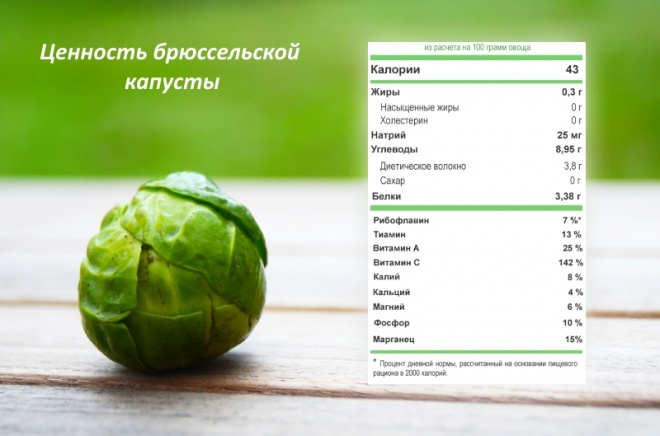
In case of an acute illness, cabbage should not be consumed in any form. As a result - a relapse of the disease. When the exacerbation has subsided (it takes about 4 weeks from the onset of inflammation), the introduction of Brussels sprouts into the diet is allowed. At first, the norm is 1-2 tbsp. l. boiled cabbage, ground in mashed potatoes. When the tolerance is good, the vegetable consumption is gradually increased from 100 to 140 g per day. If you feel unpleasant after taking it, it is excluded from the diet. The list of discomforts includes nausea, pain and bloating, discomfort, etc.
Harm and contraindications
Contraindications to the use of Brussels sprouts - disruption of the digestive system, as well as personal intolerance. It is not recommended for people suffering from gout, enterocolitis, gastritis with high acidity, esophagitis, weakness of the intestinal walls.
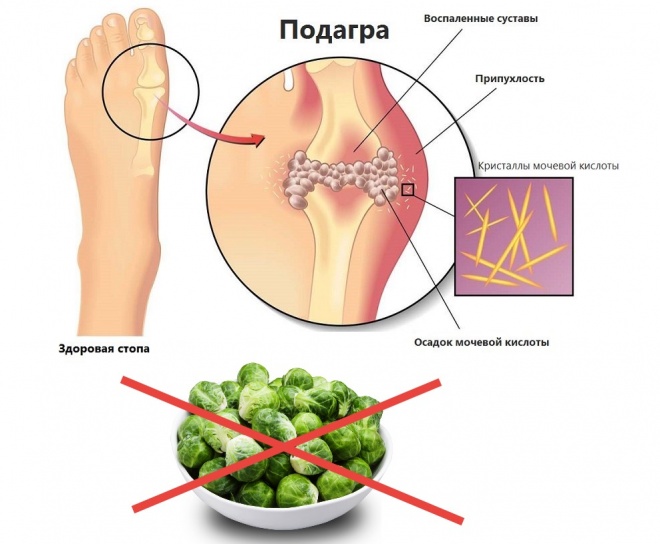
If there is a tendency to flatulence, then you should limit the consumption of the vegetable.
Recommendations for use
The vegetable is useful in any form: raw, baked, boiled and stewed. To preserve the greatest amount of nutrients in the composition, it is better to use cabbage raw for salads and other dishes. However, in this form, it aggressively affects the digestive tract.
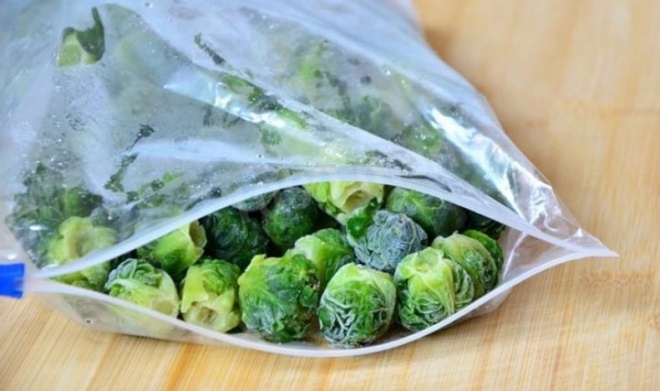
There is no clearly established norm for addition to the diet, if there are no contraindications. True, you need to use cabbage in reasonable quantities.According to experts, the weekly minimum portion is 300 g of the product. So the vegetable will bring maximum benefits in preventing cancer.
Conclusion
We examined the benefits and harms of Brussels sprouts. If you do not abuse it, then the benefits are obvious to all family members. The increased content of vitamin C and other elements made cabbage an indispensable product in the fight against various diseases, and due to its medicinal properties, it is used to prevent cancer.

